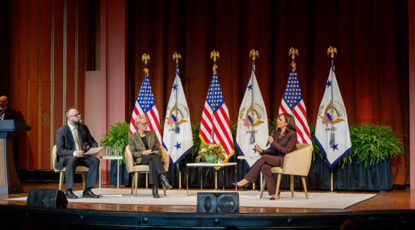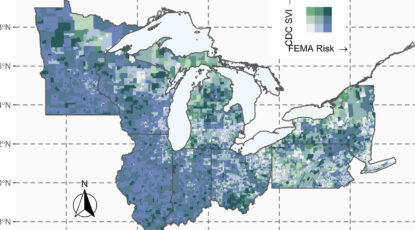-
U-M-based center awarded $5M to study climate change impacts on water resources across borders
Funding from the U.S. National Science Foundation will establish the Global Center for Understanding Climate Change Impacts on Transboundary Waters. Partners include Cornell University, the College of Menominee Nation, the Red Lake Nation, and more.
-
Modest moss supports billions of tons of carbon storage
Did you know that over its lifetime, a tree can absorb more than a ton of carbon from the air and store it in wood and roots? Researchers now contend that mosses have the potential to store a massive amount of carbon in the soil beneath them, an important antidote to climate change.
-
Collaborative project to help improve coastal community resilience in Michigan, Wisconsin
Researchers from U-M and the University of Wisconsin will assess flood risk for disadvantaged communities in Berrien County, Mich., and Milwaukee, and will provide a framework to extend the analysis throughout the Great Lakes.
-
Environmental justice expert is U-M’s first science envoy
Kyle Whyte is one of seven distinguished scientists in the U.S. tapped to share his expertise with the Department of State. The SEAS professor is an enrolled member of the Citizen Potawatomi Nation; he is an expert on climate justice and Indigenous peoples’ rights.
-
Dinosaur-killing asteroid triggered global tsunami
The miles-wide asteroid that struck Earth 66 million years ago wiped out roughly three-quarters of the planet’s plant and animal species. Meanwhile, a monstrous tsunami scoured the ocean floor thousands of miles from impact.
-
Preparing for climate-change migrants
“Climate migrants” are on the move as frequent natural disasters upend their lives and routines. The Great Lakes region could see an influx in population as a result; U-M has tools for planning.
-
U-M study: Local renewable energy employment can fully replace U.S. coal jobs nationwide
As of 2019, coal-fired electricity generation directly employed nearly 80,000 workers. A new U-M study quantifies—for the first time—the technical feasibility and costs of replacing those coal jobs with local wind and solar employment nationwide.
-
Recipe for a global crisis
The war in Ukraine, coupled with COVID-19 and climate change, is the latest in a string of dramatic shocks to global food production. At the World Business Council for Sustainable Development (WBCSD), Amy Senter, BS ’08/MS ’11, mobilizes efforts to address these formidable challenges.
-
U-M combats residential flooding in Detroit
The city’s aging infrastructure is no match for the severe effects of climate change. But with $1 million from the Kresge Foundation, U-M’s School for Environment and Sustainability will work with local partners to mitigate flooding and other concerns.










